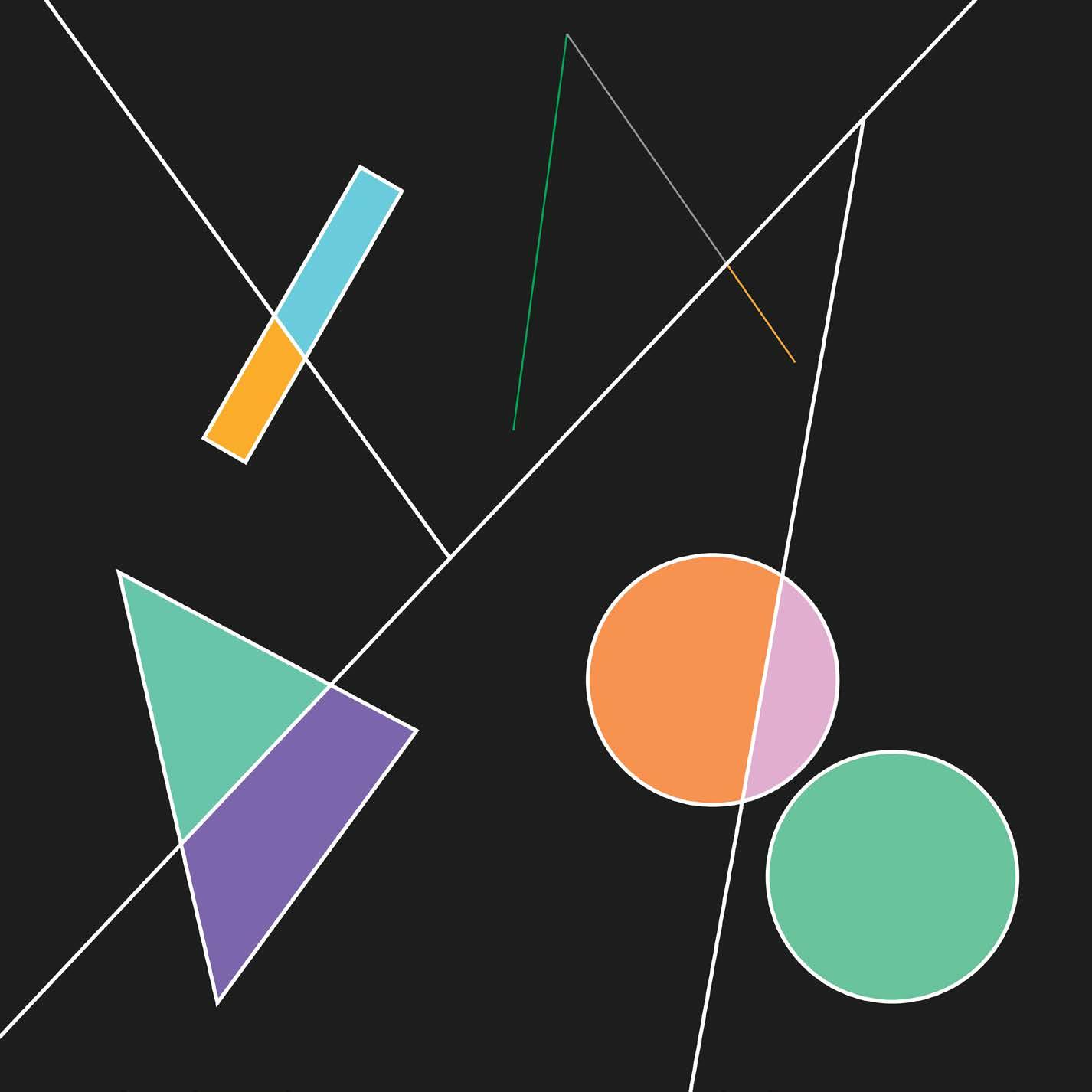

THEHERMES EXPERIMENT
HERE WE ARE THE HERMES EXPERIMENT
Anne Denholm harp
Oliver Pashley clarinet
Héloïse Werner soprano
Marianne Schofield double bass
Hanna Grzeskiewicz & Héloïse Werner co-directors
The Hermes Experiment thanks Arts Council England, PRS for Music Foundation, Help Musicians UK, the Oleg Prokofiev Trust, RVW Trust, Hinrichsen Foundation, Britten–Pears Foundation, Nicholas Boas Charitable Trust, Snape Maltings, L’Aura des Arts Festival, nonclassical and Spitalfields Music for supporting our commissioning work over the past six years; thanks also to all the composers we have collaborated with without whom none of this would be possible; James Murphy, Zoë Martlew and Elaine Mitchener for their continued support and mentorship; and to Catherine and Michael Schofield for hosting many of our rehearsals. Special thanks to the RVW Trust for financial support towards this recording,Marianne Schofield for arranging ‘Fin like a Flower’ and Emma Werner for producing the artwork.

Recorded on 9, 10 & 13 October 2019 in Greyfriars Kirk, Edinburgh
Producer/Engineer: Paul Baxter
24-bit digital
Matthew Swan
24-bit digital mastering: Paul Baxter
Design: Drew Padrutt
Booklet editor: Henry Howard Original artwork: Emma Werner
Session photography: foxbrushfilms.com
Artist photography: Raphaël Neal
Delphian Records Ltd – Edinburgh – UK www.delphianrecords.co.uk
tracks except track
At a glance, the defining feature of The Hermes Experiment might appear to be the ensemble’s ‘deliberately idiosyncratic’ instrumentation of soprano, clarinet, harp and double bass. Certainly this particular mix of timbres is distinct, yielding a rich array of sonorities from the silky to the spiky, the luminous to the percussive. Yet the ensemble’s originality extends further: such an unconventional line-up means the quartet has had to commission, arrange or improvise everything they have ever played, and in doing so, a sense of exploration and discovery infuses their work. The ten pieces included here are only a fraction of the compositions The Hermes Experiment has commissioned to date, but their variety is representative of the ensemble’s musical character in all its imagination, humour, colour and integrity.
Radiant, witty and intricate, Giles Swayne’s Chansons dévotes et poissonneuses (2014) sets three wry poems by the French poet Georges Fourest. ‘Les poissons mélomanes’ (The Music-Loving Fish) evokes the ‘pianos in the casinos’ as heard underwater by the discerning local sea-life. Swirling chromatic harmonies are interposed with vivid snippets of popular dances, including a burst of Swing, a Klezmer-infused passage as the fish perform ‘round-dances all night’, a brief excursion through the Blues, a slinking Tango and finally, a ‘Soft shoe shuffle (without shoes)’ as the casinos close for the autumn and the fish
swim on ‘in silent harmony … bored to tears’. The cycle continues with something of a cautionary tale: ‘La vieux saint’ (The Old Saint) narrates the sad fate of a worm-eaten wooden statue on being replaced by an ‘appalling’ new saint cast in ‘gilded plaster’. At its start, the score pokes fun at the sombre mysteries of the Church (marked ‘saintly and slightly arthritic’, the clarinet and double bass conjure plainsong in their strict parallel motion) but the song goes on to a strike a more heartfelt tone: the realisation that only the mottled ‘saint of wood’ could ‘carry my soul up to heaven’ is met with a blaze of harmonics and wholetone harmonies at the song’s close. The cycle concludes with ‘Sardines à l’huile’ (Sardines in Oil), which relates the plight of fish locked in their ‘tin coffins’, and oscillates between faux-serious lament and passages of puckish staccato.
Emily Hall’s two songs I am happy living simply and The end of the ending (2017) set fragments of text by Marina Tsvetaeva (1892–1941), a Russian poet renowned for both her creative and political daring. Tsvetaeva’s poems are deceptively simple and Hall’s artful settings in turn capture something of their ambivalence. I am happy living simply is at first an uncomplicated celebration of dwelling in the present, as conveyed by the buoyant tick-tock of the harp and a sweetly lilting melody in the voice. A more feverish energy begins to creep into the song, however, as
repetitions of the text grow more hectic amid flashes of dissonance. As Hall describes it, Tsvetaeva’s injunction to live ‘simply’ can only be achieved by ‘regimenting ourselves into simplification … sacrificing the beauty of chaos which ultimately is impossible to keep out’. Time weighs more heavily in The end of the ending with harp and double bass meting out a solemn pulse beneath the plaintive vocal line. Only the clarinet offers something like consolation in its ascending scale at the song’s close.
Moving from quiet abstraction to a work powerfully rooted in time and place, Errollyn Wallen’s gun gun gun (2019) sets American writer Terese Svoboda’s poem ‘Orlando is Us’. The poem imagines the experience of being present at the 2016 nightclub shooting in Orlando, and Wallen’s work captures the terror and chaos of the event with ferocious colour. A startling tremolo chord in the harp acts as a motif heard throughout the work, while clarinet and voice alternate virtuosic solo lines full of sinewy chromatic twists, bullet-like repeated notes and the occasional shriek of a siren. The final passage is an arresting account of trauma. Here, the evocation of prosaic physical details such as the repeated tap of a fireman’s hatchet in the voice and harp (marked with the direction ‘matter of factly’) contrasts powerfully with the cry of emotion heard in the vocal line as the protagonist collapses into a rescuer’s arms. From here,
the work closes with a return of the harp motif, its unchanged state suggesting a stark and affecting lack of redemption.
Uh huh, Yeah (2019) by Oliver Leith blends melancholy with mischief. Setting no other text beyond the work’s title, the piece is, in Leith’s words, an ‘expression of something confusing’ which teeters constantly ‘between joy and sadness’. Leith imagines the musicians as ‘an animatronic band, like in a USA Chuck E. Cheese restaurant … where these strange robot bears, mice and ducks perform the same music over and over again.’
A sense of good-natured resignation thus hangs over the work, from the languorous slides in the double bass to the slow sink of the harp as its strings are one by one tuned down across the work, eventually rendering the entire instrument a semitone flat. It is, as Leith suggests, as though the band is ‘running out of batteries’.
Composer Josephine Stephenson similarly conjures what she terms an ‘eerie mechanical calm’ in the middle of her song cycle Between the war and you (2017). Premiered at the 2017 Spitalfields Festival, the work was written to be heard alongside Monteverdi’s Eighth Book of Madrigals which bristles with violence and romance. Setting a text by the poet and musician Ben Osborn, Stephenson’s cycle is an arresting meditation on conflict, ecology and the
complexity of human relationships, ‘giving voice to four intertwined characters whose experiences blur the distinction between love and war’. The cycle opens with the sorrowful ‘voice of the soldier’s lover’ (i) who ‘watches war from a distance’. The cycle’s central section opens and closes with the ‘voice of the soldier’ offering tense accounts of life on the battlefield (ii.a and ii.c), while the middle song (ii.b) is the ‘voice of war’ itself and explores the ‘blind heart’ of drone warfare, with the soprano directed to deliver the text ‘in an overly performative manner, alternating between a barked robotic panic and an eerie mechanical calm’. The cycle closes with the ‘voice of the earth’ (iii) which swells and blossoms before the song’s rich counterpoint is stripped away to leave snippets of melody in the voice, the earth pleading only for ‘the noises to cease’.
Also concerned with the risks and intensities of human interaction, Freya Waley-Cohen’s
We Phoenician Sailors (2016) explores ‘the bodily experience of desire’, setting three texts by Octavia Bright which trace the course of a relationship from its ‘first agonising spark of desire to its eventual death’. The opening song ‘Oyster’ is an exercise in sensuality, from the teasing creep of the double bass line to the breathless swoops and syncopation of the voice. ‘Agua Dulce’, described by the poet as a ‘freshwater embrace’, is full of mystique in its swirling harp lines and lush
chromatic harmonies which capture that ‘sublime experience of pleasure that we know to be ultimately fleeting’. The cycle closes with ‘Delta Song’, its spikily pointillistic score conjuring the ‘disgust that can emerge when confronted with the body of a lover that is no longer desired’.
Back on solid ground, the theme of love and war continues in Misha Mullov-Abbado’s The Linden Tree (2015). Here Mullov-Abbado retains the familiar folksong-like lyrics but crafts a new melody and accompaniment. The flowing tune stays true to the bittersweet melancholy of the original, but the score also introduces a range of jazz and swing elements into the instrumental accompaniment, from a strolling pizzicato bass to the occasional quasiimprovisatory solo from the clarinet.
Joel Rust’s Pack of Orders (2017) by contrast eschews nature for the world of the machine. The work sets five poems by Soviet poet Aleksei Gastev, once known as ‘the Ovid of miners and metalworkers’, who was celebrated both as a writer and an acclaimed theorist of labour. Gastev was fixated on blurring the distinction between human and machine, and the ten poems that comprise his Pack of Orders describe, as Rust writes, ‘the creation and operation of what we now might call robots or cyborgs’. Deploying a number of unexpected objects, including Blu Tack, a plastic sheet, a quantity of water and two
milk frothers, Rust’s dynamic score is a wild ride through ‘brainmachines’, ‘electronerves’ and a ‘sky – red for excitement’ which casts the four musicians as ‘slightly malfunctioning androids’.
Returning to the mysteries of water, Anna Meredith’s Fin like a Flower (2015) was originally scored for countertenor and harp and is heard here in an arrangement by the ensemble’s double bassist, Marianne Schofield. The song sets a poem by the writer and storyteller Philip Ridley which in its fifteen short lines spins a cryptic tale of power, desire and the lure of the ocean. The glister of light on water is captured in the harp’s moto perpetuo semiquavers, but the song’s shifting metre and tricksy triplet insertions suggest something more unsettling, in keeping with the poem’s arresting blend of menace and magic.
© 2020 Kate Wakeling
Kate Wakeling is a writer and musicologist. She is writer-in-residence with Aurora Orchestra and a regular contributor to the Times Literary Supplement and BBC Music Magazine
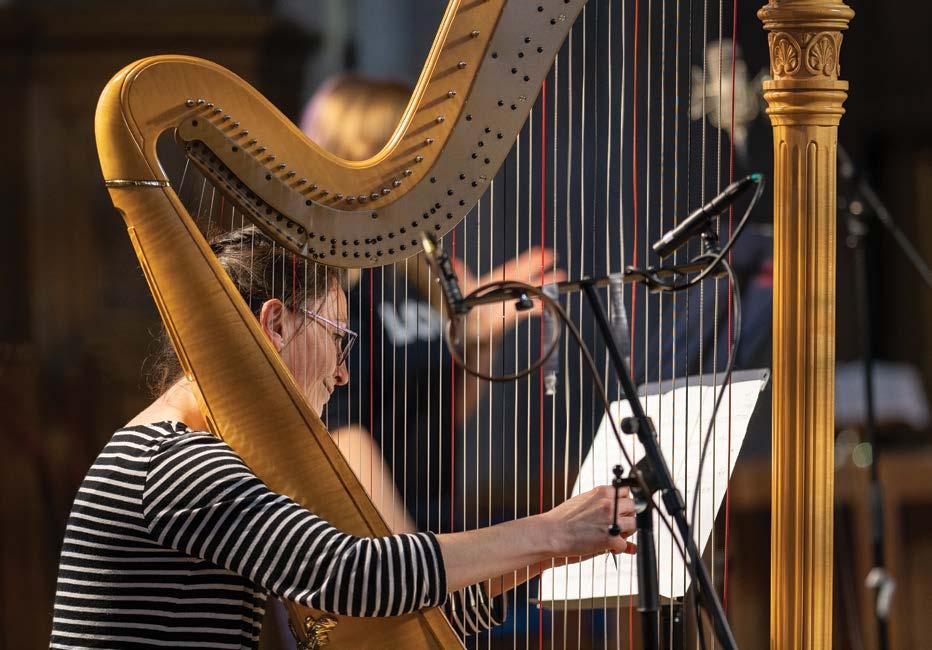
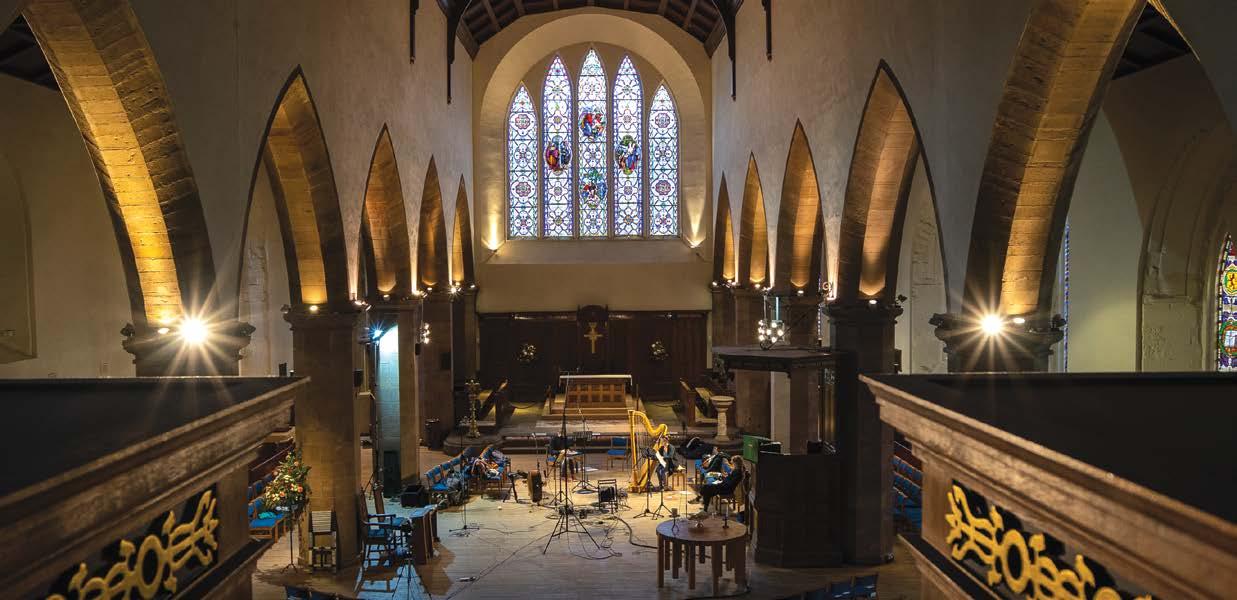
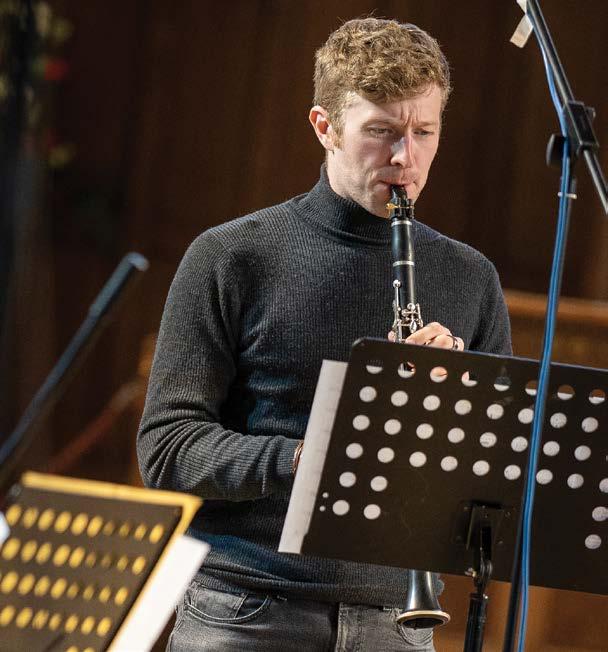
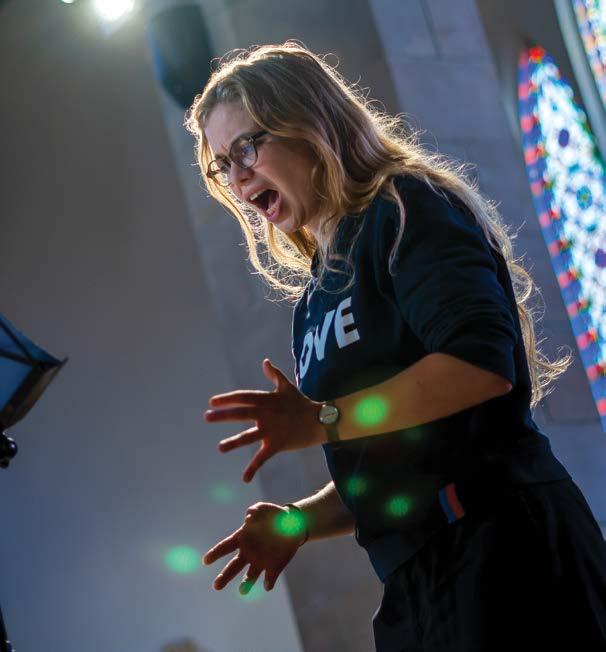

1 I am happy living simply
I am happy living simply: like a clock, or a calendar.
Marina Tsvetaeva (1892–1941), tr. Ilya Kaminsky and Jean Valentine
2 The Linden Tree
Upon a distant hillside
There stands a linden tree; As children we would play there, My friends and you and me.
We thought that it would never end For children never see: We thought that we would always play Around the linden tree, around the linden tree.
One day your eyes were misty As eyes can sometimes be; You told me that you loved me Beside the linden tree.
I thought you’d always be around For lovers never see:
I thought our children soon would play Around the linden tree, around the linden tree.
But then the trumpet sounded And love was not to be; The call to death or glory Took you away from me.
You thought that you would never die For soldiers never see:
But we will never meet again Beneath the linden tree, beneath the linden tree.
And now I lay my flowers Beside the linden tree.
Tom Parker (1944–2013) & Amy Vanmeenen
3 gun gun gun
It's like this: gun gun gun you’re dancing in the back no front no on the table no in the Gents sounds like a pop track sounds like backfire firing then he laughs shoots at no one the crowd into it please please not you crawl skitter skitter off your heels floor slick already hit you closet yourself mop-first two other guys
mop wounds it’s dark sirens call out shout back you sink to your knees almost a dance one guy breathes loud one guy pees fear crouches outside gun-
4 We Phoenician Sailors – I. Oyster
ready what if they hit dark in that closet you can only outside touch bullhorns music plays on music enters time enters you tick tick you’re losing it tick to the floor tick
a bomb blast lights
a vehicle groans sheetrock smoke a single no shots loud a man at the closet a fireman hatchet help you cry you fall into his arms
Therese Svoboda (b. 1950), ‘Orlando is Us’ from Professor Harriman’s Steam Air-Ship (Eyewear, 2016)
Watching you drink me, feeling you think me, I drown in the threads of your thoughts as they struggle to sink me. Alchemy.
Notes trill through my teeth like krill through a reef and I atrophy. Barnacled bricks stuck limpet slick, Knuckles are shredded, my blood runs thick, Breathing the depths of your full fathom eyes, my oyster flesh pinking in sympathy.
Octavia Bright (b. 1986), Huit(re)
5 We Phoenician Sailors – II. Agua Dulce
My roundels and mounds were yours to be found
You scaled them at speed
And then slid down my downs and you drowned.
Deafened by the toll of your principles I dream of a lake
(And I) wait for the ache to abait.
Sun glimmer on the brown shimmer
Hear the low-flying flock and let go, Let me drown
For the deep, reckless call of the infinite blue Speaks to my spine
To my hot, live marrow.
Octavia Bright
6 We Phoenician Sailors – III. Delta Song
Liver soft plum licker glides the satin mushroom cap
As somewhere south of leather, soft fruit begins to grow.
Slithery grip on catfish hips
Their whiskers a whisper from molten lips
Your sideways jive hums in my muscles
Mammalian jazz, a two-step hustle
Swallow my screams as a citadel falls
Where hills are flocked in velvet green.
Your body an atlas, but I’ve lost my map, Soul bent in two by your wild, wild gravity.
7 Pack of Orders
IForty thousand in a line.
Attention: an eye on the pressure gauge –solder.
Cast iron band-views.
Line Check – volley. Shot along the line.
Shell’s trajectory –ten millimeters from foreheads.
Thirty foreheads stripped –the people scrapped.
Thousand A – east.
Column 10 – to the west. Twenty thousand – freeze.
Octavia Bright II
Chronometer, on duty.
To rigs.
Rise. Pause. Charge of attention. Supply. Enable. Self-propelled. Stop.
Half a minute exposure. Switch.
Operation B.
Receiving two, receiving four. Seven.
Series twenty into operation.
III
Doctors, in ranks.
Raise the temperature.
Increase by nine tenths of a degree. The top ten.
Small pause.
Increase D to one hundred. Large pause.
E to one thousand
To rigs, blades, microscopes. Increase further.
Five-tenths.
S to one million.
Thirty cities. Twenty states. Agitprop-cannon.
Work-attack-extra.
IVPrismatic homes.
A pack of twenty districts. Into a press.
Flatten into a parallelogram. Tighten to 30 degrees. On screws and wheels. City block tank, diagonal movement.
Cut streets not trembling.
Excess thousands of calories to workers.
VFuneral at the cemetery of the planets. Roar in the catacombs of the worlds. Millions, to future hatches. Billions, stronger guns. Servitude of mind. Shackles of heart.
Engineered inhabitants.
Drive them to the geometry of the neck. The logarithms of their gestures. Opaque their romance. Tons of anger.
Normalization of speech from pole to pole. Phrases on the decimal system. Boiler-room enterprise of speeches. Destroy literature.
Throat around tunnels. Force them to talk.
Sky – red for excitement. Gears – overspeed.
Brainmachines – loaded. Kinoeyes – installed. Electronerves – work. Arteriopumps – start.
Aleksei Gastev (1882–1939), from Пачка Ордеров, 1921, tr. Joel Rust
9 Fin like a Flower
you wore your fin like a flower and by petal and perfume enticed me beyond land’s end to your teeth oh, consume me piece by piece oh, no release I’m in your power my fin like a flower
Philip Ridley
Between the war and you
10 i
the voice of a soldier’s lover strange, I misheard my own name in your voice. I watch you over the newspaper trees torn into stock market numbers failed negotiations, a bloodied face as useless as a drawn clock. My numb thumbs scroll between the news and you burning cities, half-remembered time loving in the red-green light of television I am on fire with you.
A thousand ships cross the bathroom floor strangers face off in the mirror I have compared you, oh my love, to a crew of drone operators my heart watches its war from a distance waiting out the long dark nights of blind archery.
11 ii.a
the voice of a soldier
5:47 could be weapons no way to tell no way to tell from here 6:15 is that something moving in the grey-green light of night vision no way to tell no way to tell
7:09 in the low light shapes of darkness detach and reattach 7:10 a beautiful target 7:11 over miles tired eyes caffeinated heartbeats cold sweat drops soft death press fire
12 ii.b
the voice of war the voice of war on out in you could no // am voice from television drone blind heart its green vision into distance // tell the mirror numbers I misheard //
low green useless over your love // night here // waiting trees bloodied // a something numb weapons in a grey burning red // as failed you have // here oh something torn no the face a light the light of you
13 ii.c
the voice of a soldier fire burnt skin crushed hands reach out
7:14 struggling hearbeats over the cold ground
7:15 the beautiful targeted 7:16 shapes reattach to the darkness and fade low in the light
8:23 is that something loving no way to tell no way to tell in the new light of the morning 8:52 could be children no way to tell no way to tell from here
14 iii
the voice of the Earth
Each morning I awake strewn with casualties the sheets are a campaign map and the sun is spilling blood accross my bed. In the morning light it is impossible to tell my weapons from my children.
You talk in bombs blunt as words pushing apart my waiting earth and tear my trees to paper where the blood turns into ink and photographs and fades.
A thousand predator drones cross the wine-dark Aegean.
I am on fire with you but traipsed over, entrenched, waiting out the long dark nights until the noises cease until the peace, until my worms can feed.
Ben Osborn (b. 1988)
Chansons dévotes et poissonneuses
15 I. Les poissons mélomanes
Les pianos des casinos aux bains de mer font rêver les poissons qui nagent dans la mer, car – (tous les érudits le savent de nos jours) –ils sont muets, c’est vrai, mais ils ne sont pas sourds !
Tout d’abord ils s’étonnent, roulant les yeux peureux :
« Peut-être bien qu’il tonne ? »
songent-ils à part eux –
Mais vite ils se rassurent et voyant que nul éclair ne fulgure ils battent la mesure avec leur queue !
Les sardinettes réjouies pour ouïr ouvrant leurs ouïes dansent la ronde toute la nuit.
Un grondin gronde : « Allez dormir avec ce bruit ! »
Mais les bars indulgeants sourient à cette danse et, jugeants que ce sont jeux innocents, ils marquent la cadence avec leur queue !
Les pianos des casinos aux bains de mer amusent les poissons qui nagent dans la mer !
The Music-Loving Fish
The pianos in the casinos by the seaside fascinate the fish which swim in the sea, for (as every erudite person knows, these days) they are dumb, ’tis true –but they ain’t deaf.
At first they are amazed, rolling anxious eyes:
‘Maybe it’s thundering?’ they think to themselves. But they soon calm down, and seeing no lightning flashes, they beat time with their tails.
The sardines, delighted, open their ears to hear better and dance round-dances all night.
A grumbler grumbles:
‘Stop that noise and go to bed!’
But the soft-hearted sea-bass smile on the dancing and deciding these games are harmless, they mark the tune with their tails.
Plus d’une jeune raie langoureuse voudrait être au moment du frai, car elle se sent l’âme pleine d’épithalame ! Cependant que les maquereaux galants et les petits merlans doux et dolents admirent sa tournure et battent la mesure avec leur queue !
Les pianos des casinos aux bains de mer amusent les poissons qui nagent dans la mer …
Et puis, lorsque l’automne ferme les casinos, ah ! les pauvres poissons trouvent bien monotones les nuits sans piano … Et dans leur souvenance cherchant un air qui fuit ils nagent en cadence mais pleins d’ennui !
16 II. Le vieux saint
The pianos in the casinos by the seaside arouse the fish which swim in the sea.
Dans notre église autrefois il était un saint de bois : l’air bonasse et vénérable, taillé dans un tronc d’érable à coups de hache, il avait écouté plus d’un ave montant vers lui du pavé ;
More than one sexy young female skate wishes she were ovulating, for her soul is one great epithalamium –while the gallant mackerel and the sweet, sad whitebait admire her glamorous garb, and beat time with their tails.
The pianos in the casinos by the seaside entertain the fish which swim in the sea …
Then, when autumn closes the casinos, alas! the poor fish find the piano-less nights pretty monotonous … And searching their memory for an air which escapes them, they swim in silent harmony –but bored to tears.
The Old Saint
In our church, long ago, there was a wooden saint with a sweet and venerable expression. Crudely carved with an axe from the trunk of a maple he had heard many an Ave Maria rising towards him from the flagstones.
tout vermoulu, tout cassé, le bon Dieu le connaissait bien et toujours l’exaucait. A vêpres, quand s’allumaient les cierges qui tremblotaient, un peu gourmand, il humait le bon encens qui fumait dans l’encensoir parfumé … Puis dans l’église fermée où les vitraux s’éteignaient lentement, il s’endormait priant pour nos trépassés le bon Dieu qui l’exauçait !
Mais de Paris est venu, hideux comme un parvenu, tout neuf et peinturluré un saint de plâtre doré, un affreux saint qu’ils ont mis dans la niche où tu dormis, ô vieux saint, mon vieil ami, et les sans-cœur ont brûlé, en disant « Il est trop laid ! » ton pauvre corps d’exilé.
Mais, vieux saint, je te promets que je ne prierai jamais l’intrus, mais toujours à toi s’en iront mes vœux, à toi, père qui subis deux fois, saint de chair et saint de bois, le martyre pour la foi ; et quand je mourrai c’est toi qui porteras dans les cieux mon âme aux pieds du bon Dieu …
Although he was worm-eaten and damaged, God knew him well, and always looked kindly on him. At vespers, when the candles flickered, he greedily inhaled the scented smoke of incense … Later, in the empty church, as the stained glass windows faded, he slowly fell asleep, praying to God, who looked kindly on him, to forgive us our sins.
17 III. Sardines à l’huile
Sardines in oil
But then from Paris came a saint hideous as a crude millionaire, brand-new and vulgarly daubed, a saint of gilded plaster, an appalling saint – which they placed in the alcove where you slept, old saint, my old friend. And the heartless brutes burnt your poor banished body, saying ‘Oh! He’s too UGLY!’
But, old saint, I promise I shall never pray to that imposter: my vows will always fly to you, my father, who twice suffered martyrdom for your faith –saint in the flesh, and saint of wood. And when I die it is you who will carry my soul up to heaven and lay it at the feet of God …
Dans leur cercueil de fer-blanc plein d’huile au puant relent marinent décapités ces petits corps argentés pareils aux guillotinés là-bas au champ des navets ! Elles ont vu les mers, les côtes grises de Thulé, sous les brumes argentées la Mer du Nord enchantée … Maintenant dans le fer-blanc et l’huile au puant relent de toxiques restaurants les servent à leurs clients !
Mais loin derrière la nue leur pauvre âmette ingénue dit sa muette chanson au Paradis-des-poissons, une mer fraîche et lunaire pâle comme un poitrinaire, la Mer de Sérénité aux longs reflets argentés où durant l’éternité, sans plus craindre jamais les cormorans et les filets, après leur mort nageront tous les bons petits poissons ! …
In their tin coffin, full of smelly oil, marinate, decapitated, these silvery little bodies, like the guillotined corpses down in the cemetery. They have seen the seas, The grey coasts of Thule, and, ’neath the silvery mists, the enchanted North Sea … Now toxic restaurants serve them to their customers in tins of smelly oil.
But far above the clouds their simple little soul sings its silent song in Fishy Paradise –a fresh and lunar sea pale as a TB patient, the Sea of Serenity with its long silver reflections, where for all eternity –without fear of cormorants or fishing-nets –all good little fishes will swim after they die …
Sans voix, sans mains, sans genoux (tout ce qu’il faut pour prier) sardines, priez pour nous !
Georges Fourest (1864–1945), from La Négresse blonde, 1909
18 The end of the ending
We’ve reached the end of the ending And there is nothing left to lose: We’ve reached the end of the ending, So I stroke and stroke your face.
Marina Tsvetaeva, tr. Emily Hall (b. 1978)
Sans voice, sans hands, sans knees (everything one needs to pray with) sardines, pray for us!
Translations by Giles Swayne
The Hermes Experiment
The Hermes Experiment is one of the UK’s most unusual quartets. With its line-up of harp, clarinet, soprano and double bass, the ensemble capitalises on its deliberately idiosyncratic combination of instruments, regularly commissioning new works, and creating their own arrangements and collaboratively devising their own compositions. The group regularly performs across the UK and in Europe, having performed at UK venues such as the Wigmore Hall, Kings Place, and the Southbank Centre, and further afield in Russia, the Netherlands, France and Estonia.
Since its foundation in late 2013, the ensemble has been recognised with some of the industry’s most prestigious awards: The Hermes Experiment was nominated for an RPS Award in the Young Artist Category (2019), won the Royal Over-Seas League Mixed Ensemble Prize (2019) and won nonclassical’s Battle of the Bands (2014),
as well as being Classical:NEXT Showcase Artists (2019), Tunnell Trust Artists (2017) and Park Lane Group Artists (2014/15).
As the nature of the ensemble dictates, commissioning is at the heart of its work. Over the past six years, The Hermes Experiment has worked with more than sixty composers at various stages of their careers, and many of the group’s favourite works are featured on this debut recording, which is a testament to the vibrancy of the new music scene. Additionally, the group has led numerous projects for children and young composers, from primary-school age to postgraduate conservatoire students, often through collaborations with organisations such as the Young Music Makers of Dyfed, Wigmore Hall Learning, the Royal Academy of Music, Trinity Laban Conservatoire of Music and Dance, Royal College of Music and Bristol Pre-Conservatoire.

Birds & Beasts: music by
Martyn Bennett and Fraser Fifield
Mr McFall’s Chamber
DCD34085
Martyn Bennett was one of Scotland’s most innovative musicians, combining the traditional and modern, the local and the international.
A long-planned collaboration with Mr McFall’s Chamber was never realised during his tragically short lifetime. Robert McFall has put together a programme of his own sympathetic arrangements of Martyn’s music alongside original works by Fraser Fifield, another of Scotland’s virtuosic musical innovators. The premiere recording of Bennett’s Piece for string quartet, percussion and Scottish smallpipes epitomises his sophisticated mastery of fusion.
‘Bennett’s multifaceted legacy is being advanced on several fronts, and this is a very worthwhile addition’ — The Scotsman, April 2010

Sensations of Travel: chamber music by Nigel Osborne
Hebrides Ensemble
DCD34198
This third release from Hebrides Ensemble’s acclaimed recording partnership with Delphian pays tribute to the remarkable musical and human achievements of Edinburgh-based composer Nigel Osborne with a collection of solo and ensemble works. In Mostar and Sarajevo, which he visited several times during the Bosnian War, Osborne developed a practice of music therapy for children that he has subsequently taken toward zones in Africa and the Middle East. Music’s ability to cross boundaries – to bridge nations and continents, to bear witness and to heal – lies at the heart of this album, on which Hebrides Ensemble’s eloquent advocacy is supplemented by soundscapes and sung interludes featuring the voice of the composer himself.
‘This outstanding album brims with atmosphere and imagination’ — BBC Music Magazine, May 2019
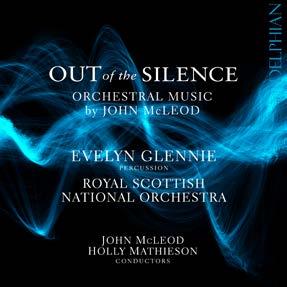
Out of the Silence: orchestral music by John McLeod
Dame Evelyn Glennie, Royal Scottish National Orchestra / Holly Mathieson & John McLeod
DCD34196
Energetic and active in his eighties, John McLeod is currently enjoying a resurgence amply justified by the indelible colour and drama of the orchestral works assembled here, three of them under the composer’s own baton. The Shostakovich Connection (1974) and Out of the Silence (2014) pay homage respectively to the Russian master’s Fifth Symphony and to the maverick yet impeccable craftsmanship of the Danish composer Carl Nielsen. The Percussion Concerto – a substantial display piece – makes full use of the extraordinary talents of Evelyn Glennie, for whom it was written thirty years ago, while the Hebridean Dances, in lighter vein yet no less vivid, bring proceedings to a rousing finish.
‘Beginning in hushed tones, this develops into something magical … [The Percussion Concerto] is particularly impactful, utilising the nuanced sounds of every instrument’ — BBC Music Magazine, August 2018

Airs from another Planet: chamber music and songs by Judith Weir
Ailish Tynan soprano, Hebrides Ensemble
DCD34228
This survey of Judith Weir’s often quirky and always engaging music displays some of the concerns that unite her writing for voice and for instruments: storytelling and the gap between truth and fiction; invention and fantasy; the lessons that can be learned from other times and other cultures. Communication between generations, continents and women lies at the heart of Nuits d’Afrique, conceived as a companion piece to Maurice Ravel’s Chansons madécasses. The hymns of the medieval Rhenish saint, poet and composer Hildegard of Bingen underlie two recent chamber pieces, while the early Airs from another Planet imagines how Scottish folk music might sound after several generations of evolution in outer space.
‘one of the most enjoyable song-cycles of recent years … the pieces on this disc are vintage Weir, so economical in their acuity, and sparklingly performed’ — Gramophone, November 2019

